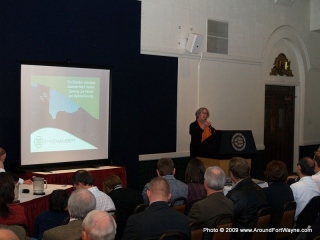Marilyn Schultz, Executive Director of MySmartgov.org, has written an op-ed piece for Indiana newspapers:
I’ve been struck over the last few months how some have devised an evolving series of arguments against the legislation that embodies the Kernan-Shepard local government reforms. Often these arguments are drummed up to cover the fact that the speaker has never had any intention of making local government more efficient, effective and accountable.
I call them the excuses du jour.
Leading into the legislative session, opponents claimed that lawmakers, so focused on crafting a new state budget, would have no time to devote to local government reform.
Never mind that the 150 lawmakers, by filing more than 2,300 bills this session, clearly intended to deal with far more than one topic. Never mind that the budget generally is developed by a handful of lawmakers and that the average legislator is mostly shut out of that process. And never mind that most Hoosiers would expect their lawmakers to be able to walk and chew gum simultaneously.
Still, proponents of good government heeded the warning and filed reform legislation in the Senate, while the budget deliberations, as required by law, began in the House.
One size fits all?
So the excuse du jour shifted to complaints that Kernan-Shepard prescribed a one-size-fits-all structure for local government.Never mind that, with few exceptions, the current, outdated structure of local government in Indiana is, indeed, one-size-fits-all. And never mind that the legislation explicitly called for local planning processes for public safety, library services and the distribution of poor relief to prepare for a transition in 2013 and for libraries to opt to be funded by the county economic development income tax.
When we pointed this out, the excuse du jour, homing in on the Kernan-Shepard call to eliminate township government, shifted to the claim that township government is closest to the people and, therefore, somehow superior to other levels of government.
Never mind that 76 percent of trustee candidates ran unopposed in 2006, leaving their offices and practices under the radar for most voters. Never mind that trustees across the state fail to list their office telephone number or post a sign outside the office to ensure that people can find them. And never mind that 566 of the 1,008 township trustees report helping fewer than 20 people a year.
When we pointed that out, the excuse du jour shifted again, this time to a contention that government streamlining would not save money.
Never mind that proponents have said all along that efficiency, accountability and improved service were the primary goals of reform, although savings would be most welcomed.
Millions in savings
Never mind that economics professors at Ball State University found that Indiana could save $400 million to $622 million a year by streamlining local government.And never mind that local governments living under property-tax caps will be strapped for revenue in the next few years and very much dependent on each taxing unit being as efficient and effective as possible.
Since we pointed that out, the excuse du jour has shifted again, now to an argument that there is no public outcry for local government reform.
Never mind that a Ball State poll released in January – before massive media coverage of the issue – showed that 67 percent of respondents wanted more efficient local government; reform was the second most important issue to them, behind only jobs.
Never mind that Indiana newspapers and broadcast outlets have run at least 900 news stories about government reform from September through mid-March, and that editorials have been overwhelmingly in support of reform.
Never mind that 7,500 e-mail messages in support of reform have been sent to lawmakers just via the MySmartgov.org’s Web site, and countless phone calls and letters have been generated as a result of our public events.
We’ve also variously heard that the bills were “gutted” or “butchered’ by the Senate, allegedly rendering them worthless. Only someone who did not read the bills would say that. While compromises were made, as they always are in the legislative process, the Senate-passed bills would have resulted in meaningful reform had the House allowed them to proceed, and we still hope to resurrect their concepts.
The real reason that some lawmakers refuse to support reform is that they fear it will undermine their re-election efforts – not among us rank-and-file voters, who will heartily support them if they support us – but among the local government officials who, as party activists, campaign for them. So the raison d’être – for lawmakers and local government officials alike – is self-preservation.
Never mind that we elected them to be leaders!
Related AFW Post:
Rally for Local Government Reform – 3/3/2009 – 21st March 2009
